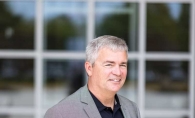During this particularly contentious election season, it can be tough to feel connected to the political process, let alone to the politicians angling for our votes. However, we recently caught up with the mayors of three Valley communities to see not only what our local elected officials are up to, but also to get to know the people behind the positions. While the mayors of Stillwater, Hudson and Afton each have a unique vision for their city and each took different routes to office, they are united in their love of the St. Croix River Valley and their dedication to civic service.
Historic Ambitions
For Stillwater mayor Ted Kozlowski, who became the city’s 51st mayor in January 2015, getting involved in local government has been a rewarding experience. Raised in Stillwater, he met his wife in San Francisco, and they spent time in Buenos Aires, Argentina, and Charlotte, N.C., before returning to Stillwater seven years ago to raise their two young daughters.
While living abroad, Kozlowski and his wife took some time to “map out what we wanted our life to look like,” he says. “Wherever we landed, we wanted to get involved in the community.”
Once back in Stillwater, Kozlowski got involved with Valley Outreach, organizing a charity event for the food shelf with the help of Sean Smalley and Lift Bridge Brewing that raised $10,000 in donations. After serving on the nonprofit’s board of directors and being elected to City Council in 2012, he ran for mayor and was elected to a four-year term that expires in January 2019.
Since taking office, Kozlowski has focused on expanding on the city’s strengths to make it a “more compelling destination for everybody,” he says. He is “very proud” of the resurrection of Lumberjack Days, a combined effort of local volunteers and city staff. “It’s a big part of our identity to have back, and it worked out so beautifully,” he says of the July event that regained its historic name this past year.
He says that last year’s connection of Brown’s Creek Trail to Gateway State Trail and the acquisition of two riverfront properties that will become parks enhance Stillwater’s appeal for local and visiting cyclists, kayakers and outdoor enthusiasts.
The next part of his term will focus on revamping downtown Stillwater, as the cessation of interstate traffic on the lift bridge presents challenges and opportunities for the city. Kozlowski sees it as a chance to redesign a more pedestrian-friendly and community-focused downtown for residents. “It doesn’t even feel like work,” he says, attributing much of his success to the engagement of Stillwater’s citizens and the passion of the City’s council members. “The history here is amazing, but it’s not just a quaint little town; we are constantly dealing with change.”
A River Runs Through It
Embracing change while retaining the character and natural resources of the community is also central to Hudson mayor Rich O’Connor’s agenda. “I want our town to embrace the river; it’s our greatest natural resource besides the people here,” he says. “If you look at the history of these river towns, the river itself is the front door.”
O’Connor thought that elective public service was behind him when he and his family moved to Hudson in 1999. He’d spent 12 years as a state representative in the Minnesota legislature and served as Ramsey County commissioner. “I was taught by my parents that public service is something you need to do,” he says. In Hudson, he became involved in several community organizations, serving as vice president of the Hudson Hockey Association board and chairing the Hudson Hospital Foundation and the Hudson Area Joint Library boards.
O’Connor says he decided to run for mayor at the urging of his peers and because there were some community projects he wanted to tackle. He took office as Hudson’s 53rd mayor in April 2016, beginning a two-year term with some ambitious long-term goals, chief among them the repurposing of the former St. Croix Meadows dog track. “I want to get something there that the whole community can rally around,” says O’Connor, suggesting that a corporate campus could be “tax revenue-producing for the city and could provide job opportunities.”
Revitalizing the riverfront with new development that supports Hudson’s identity as a “friendly river city” is also a high priority for O’Connor, an undertaking that will likely require a second term to see to completion. Though he won’t be up for re-election until 2018, he explains that the things he hopes to accomplish “take a lot of time to get done.”
“I want to get these off the ground, and I don’t want to walk away from them,” he says. “Local government is truly where the rubber meets the road.”
Natural Instincts
Afton mayor Richard Bend is also passionate about protecting the natural resources of his town while enhancing opportunities for residents and visitors to enjoy them. “By preserving our lifestyle here, we draw new residents who move here precisely to enjoy that same lifestyle,” says Bend, who developed a personal connection to nature while growing up in Afton.
A former trial lawyer who also worked as a transaction attorney with small businesses, Bend had no political aspirations when he joined the city’s planning commission, but three years ago the City Council unanimously appointed him mayor when Pat Snyder unexpectedly resigned for personal reasons. Now in his second term, Bend is still working on some inherited projects, including improvements to the city levy and the construction of a new sanitary treatment plant.
Long-term, Bend says that he hopes to strike a balance between keeping Afton’s low-density, rural character intact while encouraging a revamp of Afton’s Old Village business district that will preserve the area’s charming architecture yet allow for improvements necessary for “higher intensity business use.”
Bend, who is running unopposed for re-election this month, says that serving as mayor has been “a part of a long lifetime of supporting natural resource goals and wanting people to have places to live where there’s an intimate association with nature. Not every city can do what we’ve done.”
Though Bend hopes to see several municipal projects completed in the next few years, if re-elected he will likely not run again.
Asked what he hopes his legacy will be, Bend points to his time on the founding board of Natural Science Academy, a charter school in St. Paul that focuses on experiential learning in year-round outdoor classrooms: “I hope Afton can serve as a place for young adults to experience Minnesota outdoors close to the metro, to develop an appreciation and understanding of nature and, with that, have more than a theoretical desire to further environmental initiatives.”









